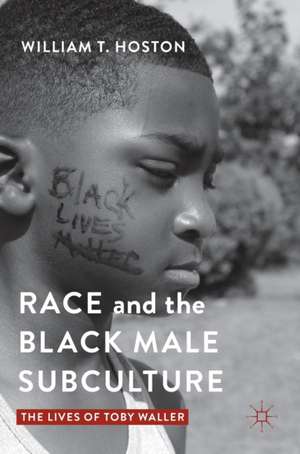Race and the Black Male Subculture: The Lives of Toby Waller
Autor William T. Hostonen Limba Engleză Hardback – 12 mai 2016
| Toate formatele și edițiile | Preț | Express |
|---|---|---|
| Paperback (1) | 208.97 lei 6-8 săpt. | |
| Palgrave Macmillan US – 27 mai 2018 | 208.97 lei 6-8 săpt. | |
| Hardback (1) | 694.37 lei 6-8 săpt. | |
| Palgrave Macmillan US – 12 mai 2016 | 694.37 lei 6-8 săpt. |
Preț: 694.37 lei
Preț vechi: 816.90 lei
-15% Nou
Puncte Express: 1042
Preț estimativ în valută:
132.87€ • 144.78$ • 111.96£
132.87€ • 144.78$ • 111.96£
Carte tipărită la comandă
Livrare economică 23 aprilie-07 mai
Preluare comenzi: 021 569.72.76
Specificații
ISBN-13: 9781137590459
ISBN-10: 1137590459
Pagini: 165
Ilustrații: XVII, 170 p.
Dimensiuni: 148 x 210 x 16 mm
Greutate: 0.35 kg
Ediția:1st ed. 2016
Editura: Palgrave Macmillan US
Colecția Palgrave Macmillan
Locul publicării:New York, United States
ISBN-10: 1137590459
Pagini: 165
Ilustrații: XVII, 170 p.
Dimensiuni: 148 x 210 x 16 mm
Greutate: 0.35 kg
Ediția:1st ed. 2016
Editura: Palgrave Macmillan US
Colecția Palgrave Macmillan
Locul publicării:New York, United States
Cuprins
Introduction:The Toby Waller Stereotype .- Part I: Devaluing Black Male Life .- 1. Black Males are Human Beings: An Open Letter .- 2. Stand “Our” Ground: Murders in the Sunshine State .- 3. We Miss You, James Evans, Sr. .- Part II: It’s Good to Be White in America .- 4. No Indictment on Canfield Drive .- 5. Target Practice: The Killing of the Black Male Continues .- 6. The Racial Politics of Marijuana .- Part III:Brothers of the Moment .- 7. Innovationist Negro: Reflections of an Ex-Drug Dealer .- 8. D.o N.ot A.ccuse Black Males: The Life of Cornelius Dupree, Jr. by William T. Hoston, Randon R. Taylor, Anna A. Thomas, and Atoya Eaden .- Post Scripts .-
I. How to Raise a Black Son in White America .- II. The Uprising: Call to Black Male Scholars.
Notă biografică
William T. Hoston is Associate Professor of Political Science at the University of Houston-Clear Lake, USA. His research interests lie primarily in the areas of minority voting behavior, political behavior of Black politicians, race and minority group behavior, Black masculinity, race and crime, and theories and dynamics of racism and oppression.
Textul de pe ultima copertă
This book is a study of black masculinity in the twenty-first century. Through a series of critical and interdisciplinary essays, this work examines the image of the black male in American society as a Toby Waller stereotype. Toby Waller is the fictional, yet symbolic character from Alex Haley’s highly acclaimed book and mini-series, Roots. It is a richly detailed, fictional story about slavery and one enslaved African man’s struggle to regain freedom. The parallel of the life of enslaved Toby Waller is similar to present day black males. Both are individuals who are often stripped of their cultural identity and exist within an institutional and systemic framework that devalues black male life. This dichotomy is the historical platform to discuss how those in the annals of white America demarcate which embodiment merits inclusion into societal acceptance.
Caracteristici
An interdisciplinary examination of black masculinity and culture in the 21st century Critiques the systemic and institutional devaluation of black male lives in American society Uses the literary figure of Toby Waller as a historical platform to examine racism and oppression




